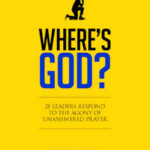We run our website the way we wished the whole internet worked: we provide high quality original content with no ads. We are funded solely by your direct support. Please consider supporting this project.

4 Reasons to Believe in a Spiritual Realm
For the last century, a large number of theologians and church leaders have claimed that the biblical view of spiritual warfare—where there is an actual realm where angels and demons exist—is no longer believable. The influential German scholar, Rudolf Bultmann famously wrote, “It is impossible to use electric light and the wireless and to avail ourselves of modern medical and surgical discoveries, and at the same time to believe in the New Testament world of spirits and miracles” (New Testament and Mythology, 5).
Many scholars continue to make this claim. The famous Catholic scholar, Hans Kung suggests that belief in Satan and demons are a piece of “outdated medieval thought” and when believed by Christians it “throws away all credibility for theology and the church” (On Being Christian, 369). Some even argue that if we believe in such things as demons and angels, then we must embrace all of the Bible’s pre-scientific cosmology, including things like a flat earth and a six thousand year old creation.
While there is no denying that there is a mythical element to the various conceptions of spirit agents in Scripture, we have to think about what it means to embrace the biblical view of spiritual warfare in a scientific age. We obviously cannot be asked to conceive of an evil cosmic agent along the lines of a many-headed sea monster (Ps 74:14) or angels riding in chariots of fire (2 Kings 6:17). It’s one thing to grant that the way someone conceived of a cosmic agent was mythic and quite a different thing to claim the very idea of cosmic spirits is mythic. All of our conceptions of spirit agents—including God—are mythic inasmuch as these agents are nonphysical. The important question, therefore, is not whether biblical depictions of angels, demons, and the powers are mythic, but whether these mythic portrayals point to actual entities.
Here I would like to offer four observations that supports the existence of a spiritual reality:
- While we have compelling grounds for believing that the cosmology of the Bible was scientifically incorrect, we have no similar grounds for concluding that biblical depictions of spirits was mistaken. To illustrate this point, one could remove the prescientific cosmology from the Bible, and nothing pertaining to its central story line and message would be lost. If one were to extract all references to spirit agents, however, the entire narrative would become unraveled.
- The only way to find no place for things like spirits and miracles is to assume at the outset that natural law as described by science provides an exhaustive account of reality. The vast majority of modern Western people have no difficulty believing in spirits and miracles while also continuing to believe in science and use modern technology. Most today do not share the metaphysical assumption that naturalistic science must explain all things.
- “Critical scholars” whose naturalistic perspective discounts biblical depictions of spirits and miracles, are in fact being uncritical as they have difficulty turning the same critical eye to discern the arbitrariness of their own assumptions. They presuppose the superiority of their cultural perspective over that of other cultures and they tend to be elitist as they presume that the masses who believe in things like spirits lack the intellectual acuity to perceive what they see. In other words, these so-called “critical scholars” are not self-critical.
- Reports of something like “demon possession” and “exorcism” can be found in most cultures and religions throughout history. It is interesting how much in common they have with the reports of the New Testament, despite the vast differences in cultures and belief systems in which they are found. What’s most intriguing is that increasing numbers of anthropologists, ethnographers, sociologists and psychologists are reporting their own firsthand experiences with the “supernatural” while acknowledging the inadequacy of natural explanations.
While we Western Christians may find it challenging to make theological sense of spiritual experiences, whatever else we make of them, they provide empirical support for the NT view that such a spiritual realm is real. The claim that modern Westerners can no longer believe in such things was never warranted or accurate, but in light of the demise of dogmatic naturalism, which tries to comprehensively explain everything through the laws of science, its fallaciousness is now more apparent than ever.
—Adapted from Understanding Spiritual Warfare, pages 129-147
Photo credit: Dustin Scarpitti
Category: General
Tags: Angels, Demons, Spiritual Warfare
Topics: Spiritual Warfare, Cosmic Conflict
Related Reading

Civilian or Soldier: Which Are You?
The Bible makes it clear that the people of God are to be on the offensive in storming the gates of hell (See post) and that Christians are to put on the armor of God (See post). However, in modern Western Christianity, it is much more common to behave more like civilians on a vacation than…

The Earth is a Spiritual Battlefield
The early Church Fathers uniformly believed that angels, like humans, were created free and given a sphere of influence and responsibility over creation. As with humans, angels could use this influence for good, as God intended, or they could choose to use it for evil. They understood that this is simply what it means for…

When Prayers Go Unanswered
Recently Frank Viola published a free e-book where 21 Christian leaders responded to the following question: Why is it that God doesn’t often answer the desperate prayers of His people for deliverance, protection, healing, etc.? You can download the free ebook by clicking here. The following excerpt is Greg’s contribution to this book: _____________________ Two very ill children are…

Do You Know of Patients Who Have Benefitted from a Spiritual Warfare Worldview? (podcast)
Greg and Dan talk about spiritual warfare and mental illness. Episode 591 http://traffic.libsyn.com/askgregboyd/Episode_0591.mp3

Book Review: Understanding Spiritual Warfare: Four Views
I just got the pre-release copy of Understanding Spiritual Warfare: Four Views, edited by my friends James Beilby and Paul Eddy (IVP, 2012). The introduction alone is worth the price of the book! It is the clearest, most comprehensive, yet most succinct overview of the concept of spiritual warfare throughout church history that I’ve ever…

Storming the Gates of Hell
Jesus said: “I will build my church, and the gates of Hades will not prevail against it.” (Mt 16:18) To understand Jesus’ teaching here, there are a few things you should know. First, “Hades” was the standard term for the underworld, which means that Jesus was probably referring to the whole of the Satanic kingdom.…
